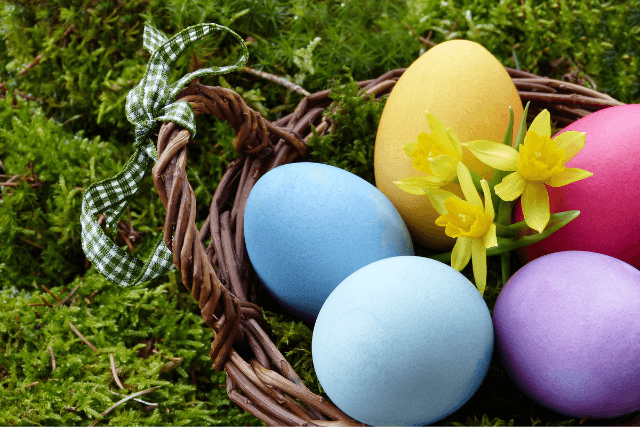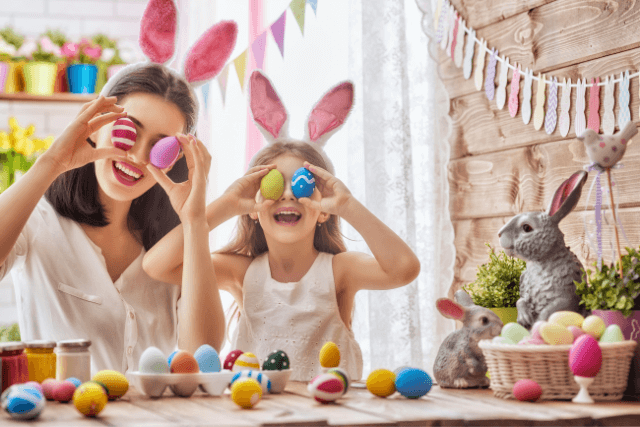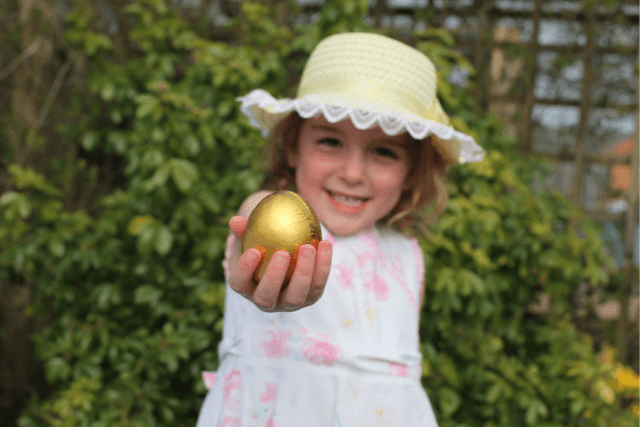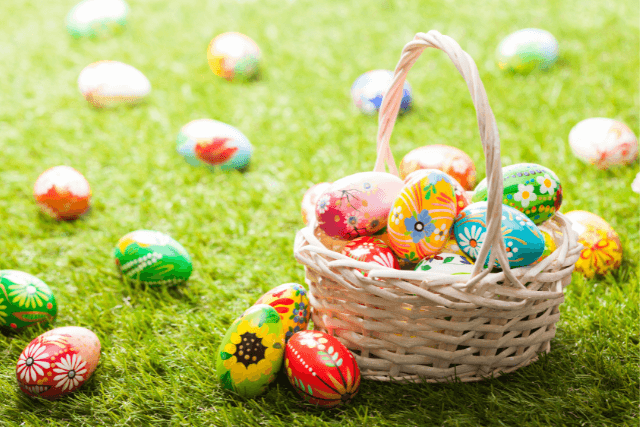Easter is a sociable time, of feasting and fun, as well as reflection and spending lots of well-deserved quality time with loved ones.
As we indulge in fun Easter crafts and eagerly await the visit from the Easter Bunny, join us as we uncover some amazing facts about Easter, shedding light on the rich history and traditions that make this holiday so special.
10 Fun Facts about Easter

Here we bring you some surprising things that you perhaps did not know about this wonderful time of year that is best spent relaxing with friends and family..
1. The Origin of the Name
The name ‘Easter’ comes from the goddess name Eostre, who was the Anglo-Saxon goddess of spring. She symbolised the awakening of the countryside after winter!
2. Easter’s Ever-Changing Date
Unlike Christmas, which falls every year on December 25, Easter Sunday rather unusually lands on a different date each year. This festival is celebrated on the date of the first moon after March 21 (spring equinox) and always falls between March 22 and April 25.
This unique timing adds an extra layer of anticipation to the Easter season.
3. Why we Paint Eggs
As we know, Easter Sunday is a festival first started many, many years ago (in 325, to be precise) to celebrate the resurrection of Jesus Christ. But, did you know that the painting and dying of eggs is to represent the blood of Jesus.

4. Symbolism in Easter Egg Traditions
Easter eggs symbolise the empty tomb of Jesus, and Cadbury was actually beaten by little-known Bristol-based JS Fry in making the first chocolate egg in the UK in 1873.
It was hand-made but made from dark chocolate and so nothing like today’s scrummy Dairy Milk eggs. Before chocolate eggs, hen or duck eggs decorated with vegetable and charcoal dye were given to children as gifts!
5. Simnel Cake Tradition
Simnel Cake is the cake traditionally eaten at Easter. It is made of light fruit cake, with two layers of delicious marzipan. The cake is then topped with eleven marzipan balls representing the eleven apostles of Christ, minus Judas, and it is eaten in the pre-Easter period. For your 2023 Easter, why not try a chocolate version of this famous cake.
6. The Evolution of Easter Bonnets
The Easter bonnet tradition represents the end of Easter and the 19th-century tradition of wealthy people wearing something new for spring after the day’s church services.

7. Hot Cross Buns through the Centuries
Easter eggs are traditionally eaten to mark the end of Lent as they contain dairy products that were traditionally given up for Lent.
The hand-crafted, Belgian chocolate ‘Godiva Atelier Easter Egg’ is the world’s most expensive chocolate egg, with a cracking price tag of £10,000, and is surely the ultimate way of breaking Easter fasting! It is 1.5m tall, and weighs 65kgs and the masterpiece took 200 hours to craft
8. The World’s Most Expensive Chocolate Egg
There were 501,000 eggs hidden over the Cypress Gardens Adventure Park in Florida on 1 April 2007, making it the world’s largest egg hunt. How many can you hide in your garden or lodge park?
9. Record-Breaking Easter Egg Hunt
As far back as the 12th century, hot cross buns have been part of Easter celebrations, most strongly associated with the bank holiday of Good Friday. They were hung in the kitchen to warn off evil spirits and the most expensive one was bought for £155 in London in 1829! How much would you pay for a hot cross bun?

10. Ancient Origins of the Easter Bunny
The Easter Bunny has been part of the Easter celebrations since as far back as the 17th century, and represents new life. Similar to Father Christmas, the origin of the Easter Bunny’s is from a German story. In the 1600s a rabbit called ‘Oschter Haws’ or Easter hare, was thought to lay a nest of colourful eggs for children who were good. When you chomp into your chocolate bunny this Easter, where will you start? Apparently, 76% of us start with the floppy ears!
And while spending the Easter holidays at home this year, why not print out our LDLH Easter Egg Hunt for the little ones to colour in, stick in your window to create your very own Easter Egg hunt for your community to enjoy!
Whether you’re embarking on an egg hunt, savoring a slice of Simnel Cake, or relishing quality time with loved ones, Easter weaves a tapestry of history and symbolism.
Let this Easter be not only a celebration of traditions but also a time for relaxation and rejuvenation. Explore our Easter Lodges to discover exclusive offerings and book your perfect holiday retreat.